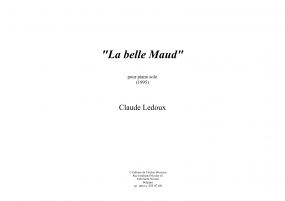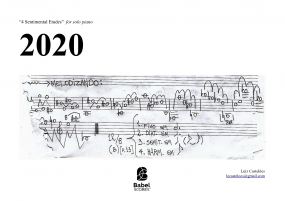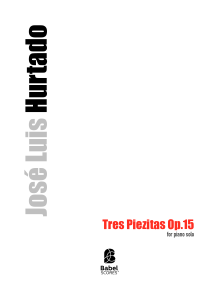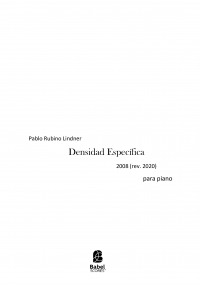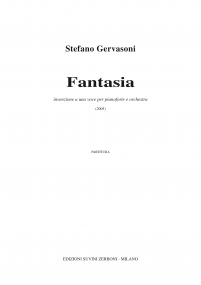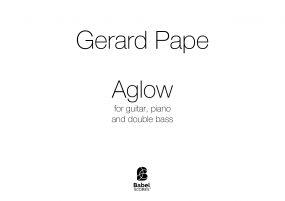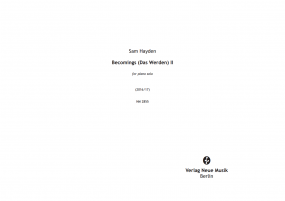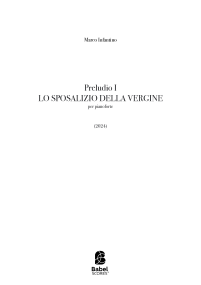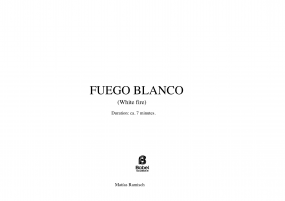Partota 1
for piano
8,00 €
Digital version (+0,00 €) instant download
Printed format (+14,80 € printing and shipping). Colissimo7-14 days aprox.
When you buy a score, you can contact the composer right here!
Specifications
Region
Europe
Estimated Duration
11 - 15min
Date
1985
ISMN : 979-0-2325-2163-3
Notes on this piece I dream PARTOTA as a paraphrase on the ( non-existing, of course) folk music of an isle in the Atlantic Ocean, quite close to Gibraltar. The main population is of Greek origin, but around 1000, the Normans came. Blood and culture were even more mixed when, in our time, black American musicians intruded the honky-tonks of our lucky isle.
So today we hear a syncretistic picture of antique Greek colored melodies, together with the harmonic sensitivity of the north - and jazzy rhythms.
PARTOTA is the name of this paraphrase. This Joycelike transformation of "Partita" includes the words "pars" (the part, der Teil) and "totum" (the whole, das Ganze), thus giving a hint to Heisenberg and the New Physics.
Since God is dead and the saying of "God is dead" is dead, I strongly feel that I am incorporated in a huge context of an unconscious, gambling creation all the same. I am created as a small part by this unconsciously playing universe, creating for myself my little universe. So there is the magic of a multidimensional DANCE: My person as a small part does the same as the whole universe: It creates, not knowing the aim.
PARTOTA ist eine Paraphrase über die Volksmusik einer Insel am Ausgang des Mittelmeers mit Namen "Arkensiël", schon auf einem Viertel der Strecke nach Amerika gelegen. Die Urbevölkerung ist griechisch, doch sind vor ca. 1000 Jahren Wandervölker aus dem Norden eingefallen. Am 29.3.1943 gab Rachmaninoff ein Konzert auf der Insel. Im 20. Jahrhundert durchzogen nordamerikanische Musiker die Kneipen, und so ergibt sich - was die Musik dieser glücklichen Insel betrifft - ein synkretistisches Bild aus altgriechisch gefärbter Melodik, nordisch-romantischem Klangbewußtsein und Jazz.
"PARTOTA" habe ich diese Paraphrase der Musik von "Arkensiël" genannt. Ich wollte in der Umformung von "Partita" die Worte pars=der Teil und totum=das Ganze verstecken als Verbeugung vor gewissen ganzheitlichen Denkweisen, die mir nahe sind: Es ist mir, als könnten wir jetzt, da der alte Gott tot ist, aus dem Alleingelassensein heraustreten: So klein wir sind, so sind wir doch der Teil eines Riesigen, spielerisch wohl entstanden, weniger spielerisch vergehend, notwendig so geworden als kleines Bild eines riesigen spielenden Bewußtseins.
So sind die Musiken, die auf der Atlantik-Insel "Arkensiël" miteinander spielen, wie ein Bild des spielenden Ganzen.
Die Sätze lauten:
1. Verstreute Funde
2. Sehr altes Lied aus Rachman
3. Beispiel heutiger Improvisation über Nummer 2
4. Glöcknerlied, um 1200
5. Tarantella-artiger Tanz, bekannt als MODERN TIMES
6. Leis "NEKRA", Grabfund
Der Herausgeber von PARTOTA:
Manfred Stahnke
Add to a playlist
- Login to create your own lists
So today we hear a syncretistic picture of antique Greek colored melodies, together with the harmonic sensitivity of the north - and jazzy rhythms.
PARTOTA is the name of this paraphrase. This Joycelike transformation of "Partita" includes the words "pars" (the part, der Teil) and "totum" (the whole, das Ganze), thus giving a hint to Heisenberg and the New Physics.
Since God is dead and the saying of "God is dead" is dead, I strongly feel that I am incorporated in a huge context of an unconscious, gambling creation all the same. I am created as a small part by this unconsciously playing universe, creating for myself my little universe. So there is the magic of a multidimensional DANCE: My person as a small part does the same as the whole universe: It creates, not knowing the aim.
PARTOTA ist eine Paraphrase über die Volksmusik einer Insel am Ausgang des Mittelmeers mit Namen "Arkensiël", schon auf einem Viertel der Strecke nach Amerika gelegen. Die Urbevölkerung ist griechisch, doch sind vor ca. 1000 Jahren Wandervölker aus dem Norden eingefallen. Am 29.3.1943 gab Rachmaninoff ein Konzert auf der Insel. Im 20. Jahrhundert durchzogen nordamerikanische Musiker die Kneipen, und so ergibt sich - was die Musik dieser glücklichen Insel betrifft - ein synkretistisches Bild aus altgriechisch gefärbter Melodik, nordisch-romantischem Klangbewußtsein und Jazz.
"PARTOTA" habe ich diese Paraphrase der Musik von "Arkensiël" genannt. Ich wollte in der Umformung von "Partita" die Worte pars=der Teil und totum=das Ganze verstecken als Verbeugung vor gewissen ganzheitlichen Denkweisen, die mir nahe sind: Es ist mir, als könnten wir jetzt, da der alte Gott tot ist, aus dem Alleingelassensein heraustreten: So klein wir sind, so sind wir doch der Teil eines Riesigen, spielerisch wohl entstanden, weniger spielerisch vergehend, notwendig so geworden als kleines Bild eines riesigen spielenden Bewußtseins.
So sind die Musiken, die auf der Atlantik-Insel "Arkensiël" miteinander spielen, wie ein Bild des spielenden Ganzen.
Die Sätze lauten:
1. Verstreute Funde
2. Sehr altes Lied aus Rachman
3. Beispiel heutiger Improvisation über Nummer 2
4. Glöcknerlied, um 1200
5. Tarantella-artiger Tanz, bekannt als MODERN TIMES
6. Leis "NEKRA", Grabfund
Der Herausgeber von PARTOTA:
Manfred Stahnke
Instrumentation
Piano
Recording
Amy Williams and Helen Bugallo
Score Details
Format - A4 / US Letter
Pages - 40
Pages - 40





